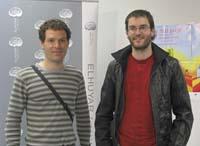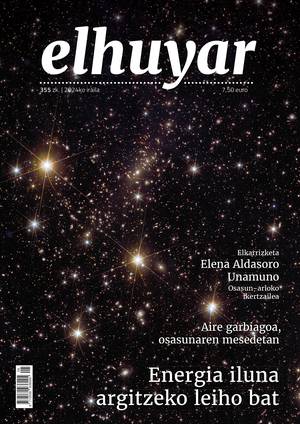Cement wins the VII. Thesis Award

Second prize for a work on sperm mobility and special mention of the best work in Basque
For the seventh consecutive year, the Elhuyar Foundation has organized the Thesis Prize. In this edition the three awards have been received by researchers from the University of the Basque Country. The first prize went to researcher Juan José Gaitero Redondo, for his work Doctor, I think my house has osteoporosis. From cement, the researcher compares in an attractive way the process of degradation of this material with bone osteoporosis or general demineralization of bones. It explains the process of degradation of cement and proposes the use of nanoparticles to mitigate it. In addition to the interesting topic, the researcher has used the comparison resource to make the topic attractive and has highlighted these two points when awarding the first prize to the work of the jury. Therefore, Juan José Gaitero has received a laptop and the possibility of spending a weekend in a rural house thanks to the collaboration of Sistek Informatics and Microsystems and Nekatur.
The second prize, as well as the special mention of the best work in Basque, went to the researcher of the same university Ekaitz Agirregoitia Marcos, for his work Opioids and cannabinoids: guardians of sperm mobility. The work revolves around the process of fertilization and the mobility of the associated sperm. As is known, to fertilize, sperm must reach there when the egg is ready, neither before nor after. The speed of sperm is controlled, among others, by internal opioids produced by the body and by internal cannabinoids. In this way, the sperm, depending on the type of opioids and cannabinoids found in the route of approach to the egg and its concentration, will increase or decrease the speed. Consequently, this work could facilitate in vitro fertilization of eggs. Regarding this work, the jury stressed that writing is clean and clear, and that the core of the thesis is well explained. Therefore, Ekaitz Agirregoitia has won second place and the prize for best work in Basque. As a result, he has won a digital camera, a weekend in a farmhouse and an MP4 reader.
This year a total of 62 works have been submitted to the awards and for the first time theses have been approved from any area of study. Work has been received from the University of the Basque Country, University of Navarra, Public University of Navarra, Mondragon Unibertsitatea and University of Deusto. The jury highlighted the ability to choose the winning works to explain the core of the research in an attractive, informative and with an appropriate terminology. All works submitted to the awards are available at www.basqueresearch.com.





